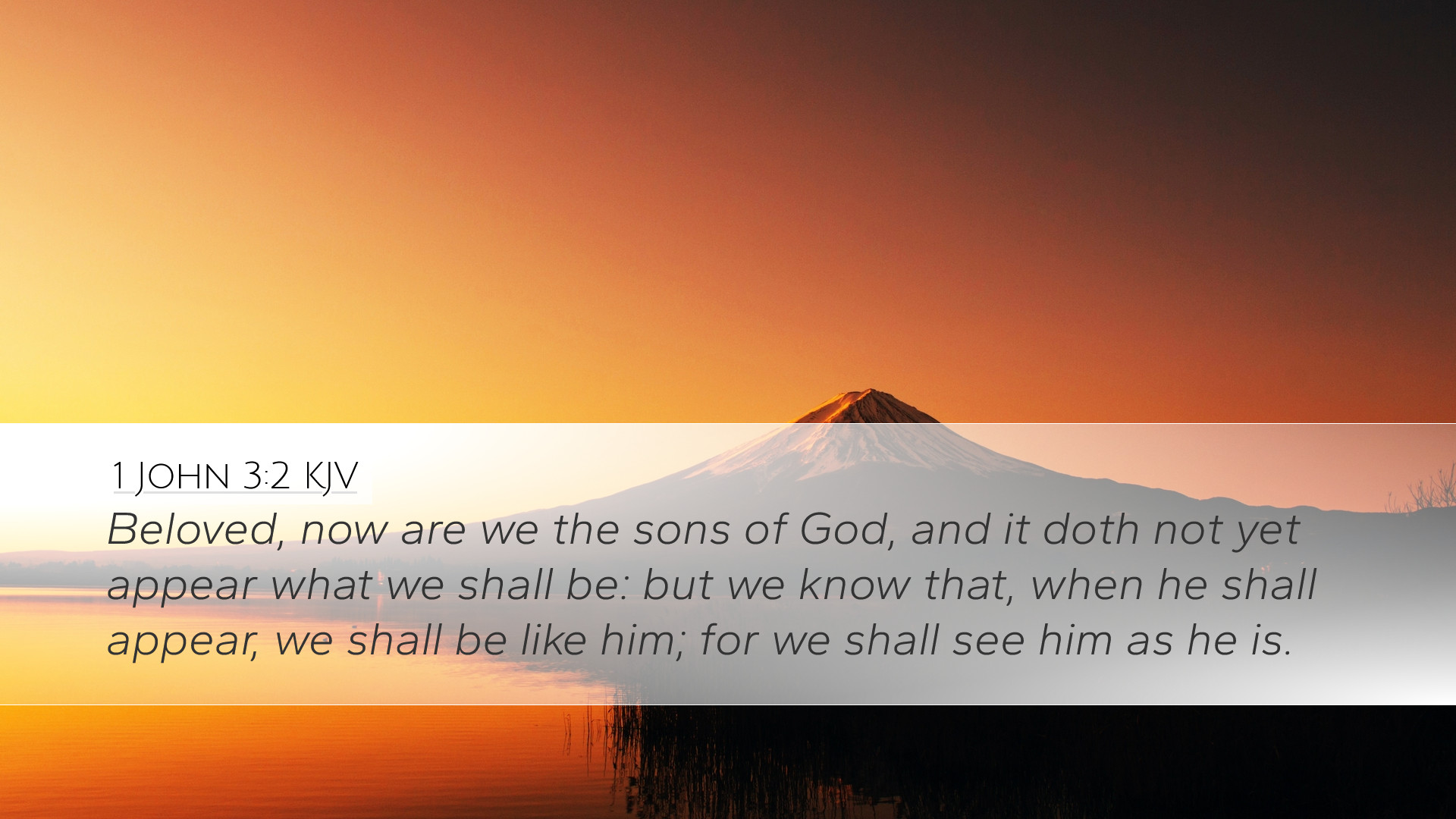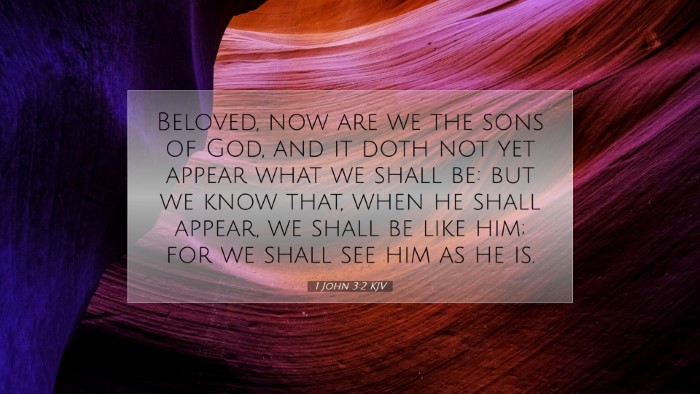Old Testament
Genesis Exodus Leviticus Numbers Deuteronomy Joshua Judges Ruth 1 Samuel 2 Samuel 1 Kings 2 Kings 1 Chronicles 2 Chronicles Ezra Nehemiah Esther Job Psalms Proverbs Ecclesiastes Song of Solomon Isaiah Jeremiah Lamentations Ezekiel Daniel Hosea Joel Amos Obadiah Jonah Micah Nahum Habakkuk Zephaniah Haggai Zechariah Malachi1 John 3:2
1 John 3:2 KJV
Beloved, now are we the sons of God, and it doth not yet appear what we shall be: but we know that, when he shall appear, we shall be like him; for we shall see him as he is.
1 John 3:2 Bible Commentary
Commentary on 1 John 3:2
Bible Verse: "Beloved, now are we the sons of God, and it doth not yet appear what we shall be: but we know that, when he shall appear, we shall be like him; for we shall see him as he is." (1 John 3:2, KJV)
Introduction
This verse from 1 John encapsulates profound theological truths about the identity of believers and their future hope in Christ. The commentary from esteemed theologians like Matthew Henry, Albert Barnes, and Adam Clarke provides a rich tapestry of insight into the implications of being 'children of God' and the glorious anticipation of seeing Christ in His fullness.
Exegesis and Theological Insights
1. The Status of Believers as Children of God
Matthew Henry emphasizes the privilege of being called the 'sons of God.' This status is not merely a title but signifies a profound relationship with God, characterized by love and familial bonds. Henry points out that this relationship includes both benefits and responsibilities, urging believers to live in a manner that reflects their divine heritage.
Albert Barnes further adds that this designation of 'sons of God' indicates both a present reality and an eternal relationship. Believers are assured of their sonship, which is given freely through faith in Christ. This assurance provides comfort and encourages a life of holiness and obedience.
2. The Mystery of Our Future State
The latter part of the verse speaks of the uncertainty about our future appearances ('it doth not yet appear what we shall be'). Adam Clarke describes this as an acknowledgment of the mystery of God's plan. He indicates that while believers cannot fully comprehend the future, they can be assured of its glory. Clarke emphasizes that the transient nature of our current understanding should lead to humble trust in God’s promises.
3. Transformation and Conformity to Christ
The promise that 'when He shall appear, we shall be like Him' carries significant doctrinal weight. It highlights the ultimate transformation of believers. Matthew Henry reflects on the essence of this transformation, noting that it is the culmination of the believer's hope and signifies the complete restoration of God's creation. This future likeness to Christ underscores the unity believers will share with Him in glory.
Albert Barnes points out that this transformation is not only physical but also moral and spiritual. Believers will reflect the holiness, righteousness, and glory of Christ, and this promise serves to motivate believers towards sanctification in their present lives.
4. The Assurance of Seeing Christ
The promise of seeing Christ 'as he is' calls for profound reflection. Adam Clarke notes that this vision will not be clouded or veiled as it is now, but will be a clear, unmediated encounter with the divine. This assurance provides a source of hope and joy, encouraging believers to anticipate Christ's return and to live in light of that future revelation.
The Practical Implications for Believers
- Hope and Anticipation: The promise laid out in 1 John 3:2 serves as a pivotal hope for believers. The certainty of our future transformation encourages perseverance in faith amid trials.
- Challenge to Holiness: Understanding our identity as children of God should challenge believers to live in accordance with their holy calling, reflecting Christ in daily life.
- Encouragement in Community: Believers should be encouraged by this truth in fellowship, reminding one another of their shared identity and future hope as sons and daughters of God.
- Mission and Purpose: The call to reflect Christ’s character should drive believers toward missional living, engaging the world with the transformative power of the Gospel.
Conclusion
The commentary on 1 John 3:2 reveals deep theological insights about the identity, hope, and future of believers. The assurance of being 'sons of God,' coupled with the mystery of what lies ahead, urges us toward holiness and prepares us for a glorious transformation into the likeness of Christ. Through the reflections of Henry, Barnes, and Clarke, we are reminded of the importance of living in light of these eternal truths as we await the joyful return of our Lord.


